Changing the constitution in Russia: Putin forever?

On 10 March the Russian President Vladimir Putin appeared in the State Duma (the lower house of the Russian parliament) to give an unannounced speech. Formally, it was a response to two requests made by deputies debating the amendments to the Constitution of the Russian Federation (on the same day a second reading of the amendments took place).
These proposals included: (1) the announcement of early parliamentary elections in connection with the planned adoption of the constitutional changes; (2) the elimination of the constitutional limit on the number of presidential terms, or a ‘reset’ to that number if these changes are adopted.
With regard to early parliamentary elections, Putin said that he saw no need for them at present. At the same time, he made it clear that the decision in this case was for the State Duma to take; if the deputies deem new elections to be necessary (as some constitutional amendments relate to the powers of the lower house of parliament), then he would accept their decision.
With regard to the limit on the number of presidential terms, Putin ruled out abolishing it. However, he conceded the possibility of ‘resetting’ his terms in office, under two conditions: firstly, if Russian citizens support the draft amendments to the constitution containing this change in the nationwide vote to be held on 22 April, and secondly, if the Constitutional Court rules that such an amendment would not contradict the Constitution. The amendment was immediately appended to the draft law on the constitutional changes, which was then adopted at its second reading.
Commentary
- For several months (especially since the replacement of the Prime Minister and the launch this January of a debate on constitutional reform), it has been clear that preparations have been ongoing to resolve the question of the succession of power after Putin’s current presidential term ends. This process has been noteworthy for sending out unexpected and contradictory signals on which scenario will be ultimately selected. The government’s aims have been to confirm the central role of Putin as the political decision maker, to test the reaction of the public and the political elite to various scenarios, and to introduce a factor of unpredictability, which is intended to hinder any attempts to interfere with this operation.
- Given the logic of the Russian political system, Putin’s statement in the parliament is binding upon all the bodies of the state, and has determined the final content of the constitutional amendments. ‘Resetting’ the presidential terms will formally allow Putin to remain in the Kremlin after 2024, which makes the following scenario most likely, albeit not certain:
- the Duma will dissolve itself after the vote on 22 April and early parliamentary elections will be held later in 2020 (probably in September);
- an early presidential election will be held, giving Putin the opportunity to remain in power for another two terms (i.e. 12 years, until 2032 at least). We should note that in the light of the constitutional amendments which have just been accepted, the position of the president will be more firmly entrenched in the system of power (primarily vis-à-vis the government and the judiciary).
- However, Putin's statements allow for quite a wide range of interpretations, and other scenarios still cannot be ruled out, in particular the President’s resignation and the appointment of a successor; such a person could run in the next election, which could be held at any date within the next four years. At the moment the potential candidates would most likely include Dmitri Medvedev, the former prime minister and current Vice-President of the Russian Federation’s Security Council; the possibility that he could run is supported by his proven loyalty to Putin, as well as the fact that he was recently entrusted with the above-mentioned prestigious position.




